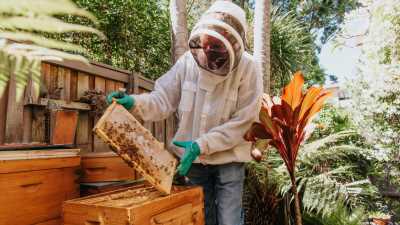
Save articles for later
Add articles to your saved list and come back to them any time.
Rob Simms has three beehives in the garden of his ground-floor flat on Sydney’s lower north shore, and gives away jars of honey to keep his neighbours sweet.
“I delayed doing anything for six or 12 months because I thought I wouldn’t get neighbour approval,” Simms said. “Now I bribe people with jars of honey and everyone’s happy.”
Rob Simms is an amateur beekeeper who keeps three hives in the garden of his flat in Wollstonecraft.Credit: James Brickwood
Simms in Wollstonecraft is one of nearly 14,000 backyard beekeepers in NSW, a number that has almost doubled in the past four years after the hobby took off during COVID lockdowns.
Simms started with two hives four years ago, and gained a third when the bees swarmed. So far, no one has complained about being stung.
But the beekeeping boom has a sting in the tale for urban living.
Petersham resident Catherine Heath considers herself pro-bee. However, this spring her garden has become a no-go zone because of aggressive bees, and she noticed an adjoining house had a sign on the front fence advertising homegrown honey.
Catherine Heath in the inner west says her family has been experiencing constant bee stings.Credit: Wolter Peeters
“It’s to the point that in good weather, we can’t use the backyard most of the time,” Heath says. “There’s a lot of bees and they behave in a strange way. They attack both dogs and humans unprovoked. If my kids use the trampoline, they’ll often run back home after a few minutes because they get chased by the bees and they get stung.”
Douglas Purdie, president of Sydney Bee Club based in the eastern suburbs and city and vice-president of Amateur Beekeepers Australia, said this was unusual behaviour for bees but not unheard of.
“Bees, like all wild things, go through cycles and temperament, just like you can have a dog that’s very nice today and tomorrow bites you,” he said.
He added it was not always the closest hive that was the culprit.
Rob Simms says his hives are five metres from his back door and he has never had a problem from the bees.Credit: James Brickwood
Purdie said a bee club could help hobbyists troubleshoot aggressive behaviour. For example, bees were defensive when honey was harvested or could be agitated by lack of food. Sometimes the solution was to replace the queen, to change the genetics of the hive.
NSW Department of Primary Industries figures show the state has 15,179 registered beekeepers and 398,263 hives. Of those, 1307 beekeepers are commercial, representing 85 per cent of hives.
That’s an increase from a total 8349 registered beekeepers in November 2019. The Australian Honey Bee Industry Council says the growth is entirely from the recreational sector.
Purdie said the boom had tailed off as lockdowns ended, and the arrival of varroa mite had caused a lot of angst.
Dr Tobias Smith judging native honey at the Sydney Royal Easter Show in 2019.Credit: Louise Kennerley
The department says 32,223 hives were euthanised in NSW between June 2022 and September this year in a failed attempt to eradicate the pest, mostly in Hunter Valley, Newcastle, Central Coast and Kempsey regions.
There has also been a boom in keeping native bees, which does not require registration.
Dr Tobias Smith, a researcher at the University of Queensland, said native bees were better for biodiversity since European honeybees compete with native pollinators.
Native bees are stingless and not susceptible to varroa mite or most bee pests. They only produce a fraction of the honey – about one litre a year instead of about 50 – but Smith says the native honey is “tangy and delicious” with potential health benefits.
“If you have flowers around, they will just do their own thing, and you sit back and enjoy watching them,” Smith said. “They’re a really easy pet.”
Start the day with a summary of the day’s most important and interesting stories, analysis and insights. Sign up for our Morning Edition newsletter.
Most Viewed in National
From our partners
Source: Read Full Article



